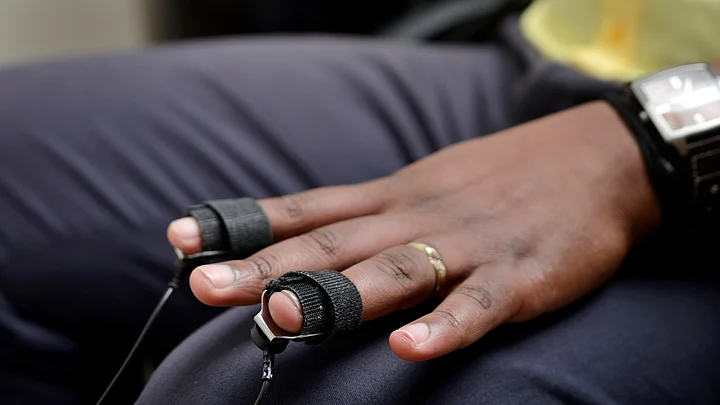Every few months “lie detector” tests make their way into crime-related news stories. This time, it is because the Delhi Police have approached the courts seeking permission to administer tests to three witnesses, who they believe are hiding information crucial to solving the Sunanda Pushkar death case.
It is unclear whether the court will approve the police’s request on Wednesday, but here are just some of the things you need to know about the ‘lie-detector tests’.
What are Lie Detector Tests?
They are actually called Deception Detection Tests (DDT) and are basically of three types: narco-analysis, polygraph and brain-mapping. (See a research paper by a psychiatrist at the National Institute of Mental Health and Neuro-Sciences in Bengaluru here).
Narco-Analysis
This involves the injection of drugs which take a person into different stages of anaesthesia. In this condition, the individual may be less inhibited and therefore likely to reveal information when questioned.
But medical research shows that many people retain their ability to deceive even under the influence of these drugs. These drugs, which are often called ‘truth serums’ do not actually guarantee that someone will actually tell the ‘truth’.
Polygraph Test
This test is based on the premise that certain biological responses are affected by lying, such as heart rate, respiratory rate, skin conductance, electro-myography.
But changes in these indicators can also be triggered by a variety of other causes such as anxiety, nervousness, fear, confusion, hypoglycaemia, depression and substance withdrawal.
It could also depend on the manner in which the questions are asked. People could be trained to control these response and remain calm even under stress.
Brain-Mapping Tests
They are based on the principle that the brain produces a unique brain-wave pattern when presented with familiar stimuli.
However, a person being questioned in connection with a crime may be completely innocent and yet be familiar with the event on account of being an actual witness (bystander), or may be exposed to media reports or discussions, thus making the test results difficult to interpret.
Can Lie-Detector Tests Really Detect lies?
Medical evidence shows that these tests are not without their share of problems, and the medical community agrees that the results are not 100 percent accurate, but they do not agree on the margin of error.
Therefore, the question of ‘passing’ or ‘failing’ a ‘lie-detector’ test must not really arise, and headlines such as “Badaun murders: All five suspects clear lie-detector tests” or “Prime witness in Badaun ‘rape-murder’ case fails lie-detector test” have to be understood in this context.
Are they legally permissible?
Now this is actually why the Supreme Court was approached in the case of Selvi and others in May 2010, and at present, this has two dimensions: whether tests can be permitted at all, and can the results be admitted as evidence in court.
At the heart of the matter is the right against self-incrimination, enshrined in Article 20 (3) of the Constitution. This is how the National Human Rights Commission explained the situation in connection with the Constitutional rights of a person: “There is a vast difference between a person saying, ‘I wish to take a lie detector test because I wish to clear my name’, and a person is told by the police, ‘If you want to clear your name, take a lie detector test’. A still worse situation would be where the police say, ‘Take a lie detector test, and we will let you go’.”
After citing a number of research papers both medical and legal from respected journals, and referring to cases from courts across the world, especially the United States of America where these tests are allowed, the Supreme Court permitted voluntary testing and held that under no circumstances must forcible testing be permitted, as it amounted to torture under international law.
The Court also said it was “the task of legislature to arrive at a pragmatic balance between the often competing interests of personal liberty and public safety”.
Even when performed with the consent of a person, the Court mandated that it must be done in accordance with NHRC guidelines. The court also makes it clear that statements recorded upon the administration of these tests are inadmissible as evidence under Indian law.
Do Other Countries Allow Lie Detector Tests?
The Unites States of America and Japan allow lie-detector tests in different capacities.
(At The Quint, we question everything. Play an active role in shaping our journalism by becoming a member today.)
